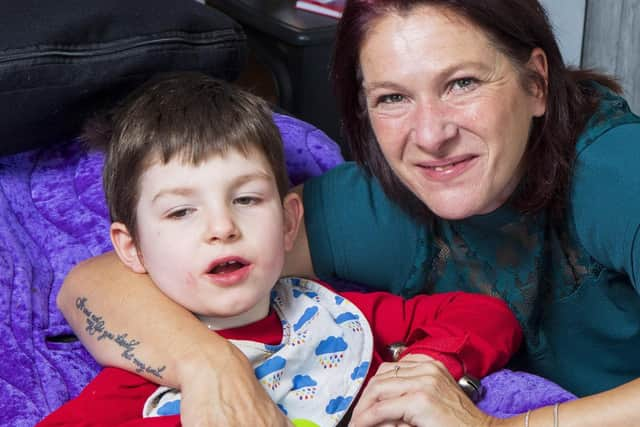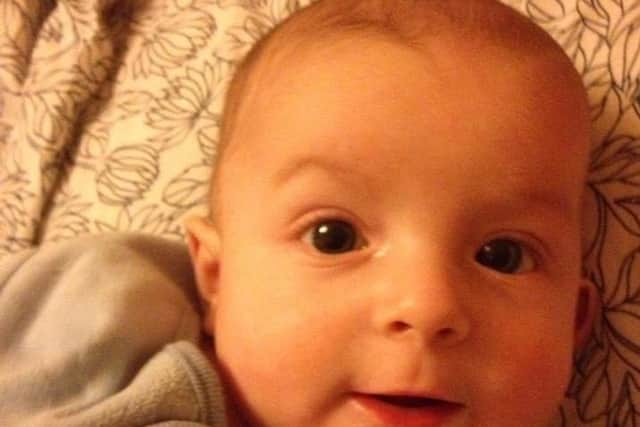Scottish boy with dementia at six-years-old forgotten all words apart from 'mummy'
Reece Mitchell has just one word left in his vocabulary - mummy - after being diagnosed with the condition when he was five.
He started having seizures when he was a toddler, and while doctors initially linked it to his autism, tests revealed it was much more serious.
Advertisement
Hide AdAdvertisement
Hide AdReece slowly began to lose his ability to communicate, drink and walk and now he can only eat pureed food and utter a single word.


He has Batten's disease - a rare form of childhood dementia which has no cure and offers a life expectancy of just 12 years.
Single-mum Donna, 46, from North Kessock in the Highlands is devastated but has vowed to remain positive and make the most of what little time Reece has left.
She said: "Despite being just six, Reece has taught us more about life and love than anyone.
"Unfortunately you only properly appreciate life when it's threatened, and Reece is losing a little more of his life with every day.


"I occasionally see a glimmer of the old Reece, when he lets out a cheeky smile or reaches for my hand, but this disease has stolen his character and his spark - I wouldn't wish it on my worst enemy."
Seizures
Reece was diagnosed with autism aged three, after displaying behaviours since birth that set him apart from his peers.
But this didn't stop him, and the 'cheeky' toddler flourished at main-stream nursery with the help of learning support assistants, hitting his milestones like any other child his age.
Advertisement
Hide AdAdvertisement
Hide AdIn January 2017 however, he started to suffer from worrying seizures, which got increasingly worse and more frequent as time went on.
Donna, who worked with adults with special needs, had to give up work in order to take care of Reece full-time.
But her work with people with special needs helped to highlight the problems her own son was having.
"I could tell the symptoms Reece was experiencing were more than just autism," said Donna, who has daughter Courtney, 26, and Alexandra, 16.
"We'd had a lot of training with work and the seizures seemed out of character so I knew we had to see the doctor."
Diagnosis
Reece was suffering from the severe seizures around four or five times a day and often through the night, meaning Donna had no choice but to make Reece sleep in her room.
His behaviour was also getting more erratic, and he would occasionally become very aggressive, which mum Donna described as 'completely out of character'.
Doctors referred poor Reece for an EEG brain scan, and later an MRI - neither of which highlighted anything to be overly concerned about.
Advertisement
Hide AdAdvertisement
Hide AdBut a round of blood tests in July 2018 picked up that Reece had a metabolic storage disorder - which left the family with a long list of possibilities.
"We didn't know what it was straight away, just a list of things it could be," Donna said.
"I couldn't help but look on Google at what we might be facing.
"There was one condition - Batten's disease - that ticked all of Reece's symptoms, and although I never mentioned to anyone, I knew that was the diagnosis we were going to receive."
A routine eye exam in August picked up that Reece was severely visually impaired, something he had been unable to tell his mum as he had already begun to rapidly loose his speech.
It wasn't until September 2018 that doctors confirmed Donna's suspicions, and Reece was diagnosed with Batten's disease, a rare form of childhood dementia.
"I had never heard of it before that summer, and although I was prepared having done my research, it was still a shock to hear it out loud," Donna said.
The condition - which affects an estimated 100 - 150 children in the UK - has no cure and offers a devastating life expectancy of just 12-years-old - with only 50 having the same strain as Reece, known as CLN2.
Advertisement
Hide AdAdvertisement
Hide AdIt leaves children suffering cognitive impairment, seizures, and progressive loss of sight and motor skills.
'I refuse to be sad'
Early symptoms of the terminal illness appear between the ages of five and 10 years and parents have no choice but to endure the agony of helplessly watching their child's rapid decline.
"We weren't going to wallow in self-pity and I refuse to be sad while he's still here," Donna said.
"The girls and I will enjoy the time we have left with him, and have already been lucky enough to go on some amazing trips."
Last December, the family visited Lapland thanks to a local charity called Mikeysline, and Make a Wish have also gifted them a visit to Knockhill Race Track so Reece could enjoy his love of cars first hand.
They have also been invited to the fire station and police station, where Reece has met his 'heroes' and pretended to drive in the engines.
"It's amazing to see his eyes light up when we go to these events," Donna said.
"It doesn't happen very often but I know my little boy is still in there, even if it's deep down.
Advertisement
Hide AdAdvertisement
Hide Ad"As with all dementia sufferers, Reece can display very difficult behaviours.
"But you can tell he tries so hard, which I appreciate more than anything.
"I still count our blessings because he's doing really well despite it all and compared to other children with the disease."
'Normal as possible'
The Batten Disease Family Association has been pivotal in providing the family and everyone involved in Reece's care with information to help them cope with the changes he is going through.
He attends a specialist school which helps to keep both his and mum Donna's life as 'normal as possible'.
"Reece is now completely blind which makes him totally dependent on me and his carers," Donna said.
"He can't walk either, so is confined to a buggy, and he's lost all of his words - but he still knows 'mummy' which never fails to make me smile."
The condition is inherited, with both parents having to be carriers of the faulty gene.
Advertisement
Hide AdAdvertisement
Hide AdBoth Courtney and Alexandra decided to be tested, but won't have the results back for a while.
Eventually, Reece will lose every skill he has learnt in his short life, ending up bed-ridden and without the ability to express himself at all.
He currently eats pureed food and has to receive his liquids through a feeding tube, but will eventually need all food through his stomach peg when he forgets how to swallow.
"As much as this is awful - and I wouldn't wish this on my worst enemy - despite being six, Reece has taught me more about life and love than anybody else," Donna said.
"As his mum, I know he's still in there somewhere, and I will do my absolute best to make the time he has left as special as possible for him."